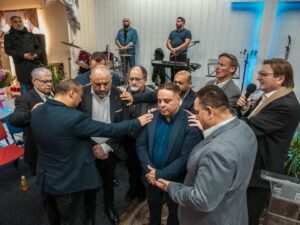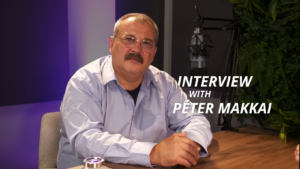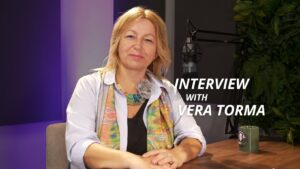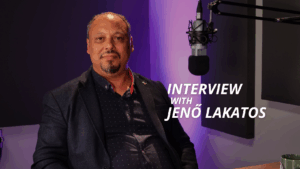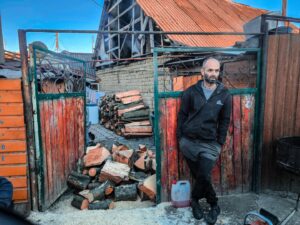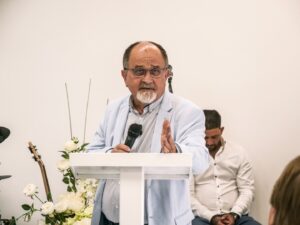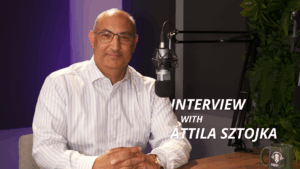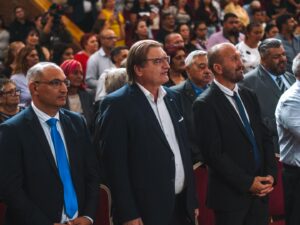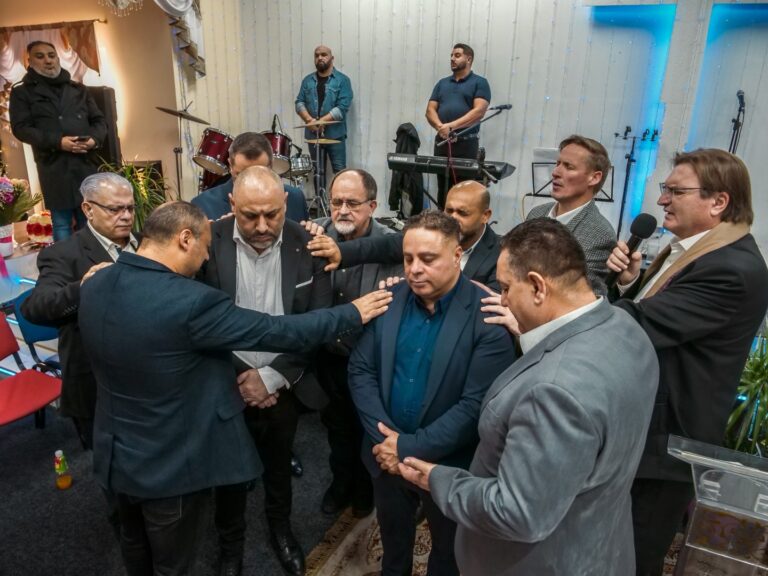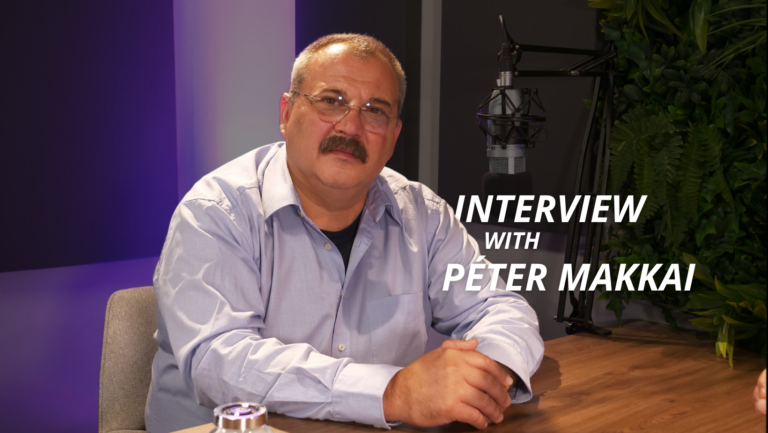Today’s guest on ReményCast is Pastor Miklós Rézműves, executive elder of the Hungarian Gypsy Missions International, who recently faced a life-threatening illness. In this conversation, we’ll explore what illness he battled, the sources of his strength during recovery, how his relationship with faith evolved, and whether he has been able to process this challenging experience. True to the show’s spirit, we’ll also discuss the beauties of life: family, children, the value of ministry, key issues affecting the Roma community, and even his love for poetry.
Though many of us at the mission know you well, some of our listeners may not. Could you share a bit about yourself, such as where you’re from, where you were born, and where you currently live?
Thank you for having me. I’m glad to be here. I currently live in Nyírvasvári with my wife and three sons. I was born in Mátészalka, but when I was six months old, my father died in a work accident in Budapest. Unfortunately, I never knew him, and his absence deeply impacted my life. We moved to Hodász, but my maternal grandparents didn’t want my mother to be alone, so we returned to Nyírvasvári, where I grew up as the only boy.
Was your childhood challenging, or did your mother manage to provide everything you needed?
My mother did everything she could for me. She chose not to remarry, as she didn’t want me raised by a stepfather. Her deep love for my father meant a lot to her, and she sacrificed a lot for me. Though she tried to provide, we faced hard times, especially near the end of each month. During those times, we relied on help from relatives, so I know firsthand what it’s like to have nothing.
I was an obedient child. After elementary school, I went on to high school to study as a machine locksmith. However, I fell in with a rough crowd, began smoking, drinking, and eventually became addicted to gambling. It became a significant issue, and I lost control over my life.
How long did this phase last? What led to your transformation?
One day, I was returning home, slightly tipsy, and as I walked in, I heard singing. Recognizing it as worship music, I went inside, where a small group had gathered. Afterward, my mother told me that she had found faith, come to know the Lord, and was preparing for baptism. I noticed a change in her; the sadness in her eyes was gone.
How did your own conversion happen, and when did you feel freed from your addictions?
My conversion happened during a small gathering. The leader prayed a confession that included addictions like cigarettes, alcohol, and gambling. I repeated the prayer, though I didn’t feel anything immediately. However, hours later, I realized I didn’t want to smoke, and the next day, I no longer felt the urge to visit the pub. The Lord completely freed me, and now, nearly twenty years later, it’s as if I had never struggled with those things.
How did life change after your conversion?
I became deeply immersed in the Word. News of my faith spread quickly, and before each gathering, I would bike around the village, inviting others. I couldn’t put down my Bible, reading and taking notes day and night. At a three-day celebration, a leader from Debrecen prayed for me and shared that he felt God had called me to preach. This was my first indication of a calling to serve.
And that marked another turning point in your life. How did your friends react?
The entire village was surprised, and my friends began attending gatherings, eventually getting saved and being baptized. This sparked a revival, and seeing such change in those around me gave me great reassurance.
After converting, what path did your civilian life take? Did you work, study, or go in another direction?
After my conversion, I worked in public employment for a long time because my disrupted life had delayed my studies, which I had to make up for later. I started preparing for my high school diploma, which wasn’t easy. Surmán László, who mentored me from the beginning, played a huge role in this. He was always there, helped me, and even today I can count on him for everything.
How did you come into contact with the mission?
About six months after my conversion, I met Laci in Kántorjánosi when the first council was being established. He began coming regularly, meeting with us men who had converted or were considering ministry. He invested a great deal of time in us, and through his influence, I began to enjoy learning and eventually completed high school.
How did church planting begin in the area?
The small group gradually grew into a church, and the mission provided us with a building. After a few years, we expanded to neighboring villages, and churches began to form. Initially, we lacked transportation and often relied on finding rides, but András Berki later offered us his Opel Vectra, allowing us to begin mission work in earnest.
How did you meet your wife, and what role does she play in your ministry?
I met my wife in the Nyírkáta group, where she led worship while I preached. Our connection grew quickly, and we felt that our relationship was guided by God. She is an enormous support for me, managing the home and raising our three children while I fulfill my calling.
Tell us about your children and fatherhood!
I have three children: my oldest son, Ruben, is 13; my middle son, Jonatan, is four and a half; and my youngest, Efraim, is two and a half. Fatherhood was initially difficult for me because I had no role model to show me what being a father is like, so I relied on the Word. They could tell you better what kind of father I am, but I try to do my best to be the best father for them.
Throughout your life, you’ve experienced several painful losses, including the passing of your parents. How did you cope with these tragedies, and what impact did they have on you?
My mother’s illness caught us by surprise. The first real indication came when she was hospitalized, and the doctor told us she was in the final stage and to prepare for the worst. In that office, a world collapsed inside me, filled with pain and questions for the Lord. On the way home, one of my brothers drove, and I sat in the passenger seat, feeling inconsolable. But then the Lord spoke to me, bringing to mind a verse from the Gospel of John: “Whoever believes in me, though they die, will live.” This word brought me peace: although my mother is gone, she lives on. This verse has remained my anchor, though I miss her deeply.
How did this affect your ministry?
If I hadn’t been a believer, I may have reverted to old habits. For months after her death, I preached from old notes, unable to find fresh insights. The breakthrough came when I openly shared what I was going through. From then on, I began to renew, and I could continue the ministry again.
What are the challenges of leading a church today, especially with the internet and new distractions? What do you see as the most important changes, and what goals have you set for your community?
Church leadership is becoming increasingly difficult, especially because the internet allows people to follow teachings and join online churches comfortably from home. This makes it much harder to physically keep people in the community, as everyone is constantly pulled in different directions and always rushing. However, I believe that true change can only come through the Lord, especially for the Roma community. I am happy to see more people pursuing education and training, which can bring significant changes. Within a decade, I hope that many young Roma will become role models in the professional world, whether as doctors, officials, or in other fields. For example, my cousin is completing a master’s degree in Debrecen and will be a university lecturer—a huge pride for the family and community.
How has education impacted your life and your hopes for the Roma community?
Education has been life-changing for me. Now, as a student at Baptist College in Budapest, I aim to set an example for my children. It’s important for me to show them what it means to commit, to prepare, to submit assignments on time, and to support their perseverance. Through this, they see an example that hard work brings results. My love for learning is now deeply rooted, and I believe this attitude will propel the Roma community forward. One day, many will achieve professional success, which we can all be proud of.
Does this add to your ministry and knowledge?
I see everything from a completely different perspective, and I am certain that if the Lord grants me grace and I earn my degree, I will continue my studies and likely pursue a master’s degree. The mission has given me an opportunity to grow, which I wouldn’t have without it. Albert always emphasized the importance of learning, and I’ve developed greatly through him. The mental support, the work invested in learning, all these have given me the chance to move forward, and without them, I wouldn’t be where I am today.
You faced an illness. It wasn’t a minor illness, but a very serious one. You were between life and death. What exactly was it?
It’s always hard to talk about this. On December 3, 2020, I likely contracted COVID-19. The symptoms began on December 6 and worsened. By December 17, I was hospitalized with severe pneumonia. I woke up on January 1, discovering I had missed two holidays. Recovery was tough, especially mentally, but my faith and the support of my family pulled me through.
And what happened after that, how did you recover?
The most challenging part was the mental aspect. Physical recovery wasn’t as hard as the psychological part. I had to take medicine three to four times a day. The biggest shock was when the doctor told me I couldn’t walk. In a month, I had forgotten how to walk. This was very hard; I tried to stand up, but I simply couldn’t. The days were long, but I kept serving, singing praises, and focusing on God. My wife came in every two days, taking the risk of catching the virus herself, which gave me a lot of strength.
What was your recovery process like after leaving the hospital?
The doctors initially recommended rehab, but because my will was so strong, they decided to send me home. They said I would recover faster surrounded by family and love. When they told me this, I could hardly believe it. When I got home, I felt like I’d been reborn, everyone came to help me. My wife helped me with everything, even basic things like bathing and using the bathroom. This support was a huge help. During my recovery, I lost 20 kilograms in a month. It was a tough time, but after four months, I started serving in the church, and after six months, I returned to active ministry.
Did facing death change your relationship with the Lord?
I didn’t feel disappointed, but it was difficult to process why I survived when others did not. A friend reminded me, “Lazarus also rose, but eventually died again.” This helped me accept that my life is a gift of grace. When I woke up in the hospital, I strongly felt the power of many people praying for me, and this amount of prayer, the strength of the community, was wonderful.
Have you witnessed many healings or miracles in your ministry?
I’ve seen many miracles. One of them, which stands out particularly, happened in Piricse when we began evangelizing, and many people were saved. At one gathering, a family opened up their garage for us to hold a service. The weather and the family itself were against it, and many said we shouldn’t go, but I felt we had to go, that we had to hold the meeting. So we went.
You write poetry as well. How did that begin?
Yes, I write, though I can’t explain exactly how it began. When inspiration strikes, I start writing, especially in the evenings when I lie down. Two or three years ago, László Surman started a group online where we shared poems, and one day, one of my father’s siblings approached me in a shopping center, telling me that they had read my poems and that my father had also written poetry.
Let’s end our conversation with you reading a poem aloud.
A Year After Covid
Today marks a year, dear family,
since Christmas passed without me.
The virus separated us,
casting our future into uncertainty.
Machines kept me alive,
surrounded by doctors and nurses.
Even in deep sleep, I dreamed of you,
never imagining a Christmas like this.
I imagine that Christmas at home
was spent in prayers, tears to God—
pleading for my life to endure.
Recalling countless cherished memories,
hoping to believe there would be
another chance for an embrace.
The holiday of love slowly passed,
but our family’s story worsened.
One percent chance remained for me,
and I think half the country wept for us.
The love of my life, my dear wife,
what must she have endured with our two sons?
I’m even afraid to imagine.
At ten, Ruben had to live through this,
yet I’m sure he believed
he’d still sleep beside his dad.
The days must have passed slowly for the family,
facing New Year’s Eve without husband and father.
Many were likely preparing for a funeral,
but on the year’s first day, the father awoke.
After waking, he slowly realized
he had walked through the valley of death’s shadow.
But God did not leave him alone,
so he could lead many to the truth.
At home, the family rejoiced
as if a newborn had arrived;
no one thought of that sorrowful Christmas anymore.
The despair, sorrow, and grief vanished.
Only God could do this—
that’s certain.
After 34 days, I finally came home.
I can truly say, I was reborn.
I had to relearn to walk.
Thank you, my dear love,
without you, I couldn’t have stood again.
My younger son, Jonatan, didn’t recognize me;
thinking of it makes my heart tremble.
For a time, even Ruben kept his distance,
but love dissolved every barrier.
Now, as the holidays draw near again,
we are close to a new life.
The family awaits Efraim, our third son, together.
Thank you, dear God, for hearing our prayers.
Thank you to everyone who helped us in any way.
Thank you, thank you, we thank you.




